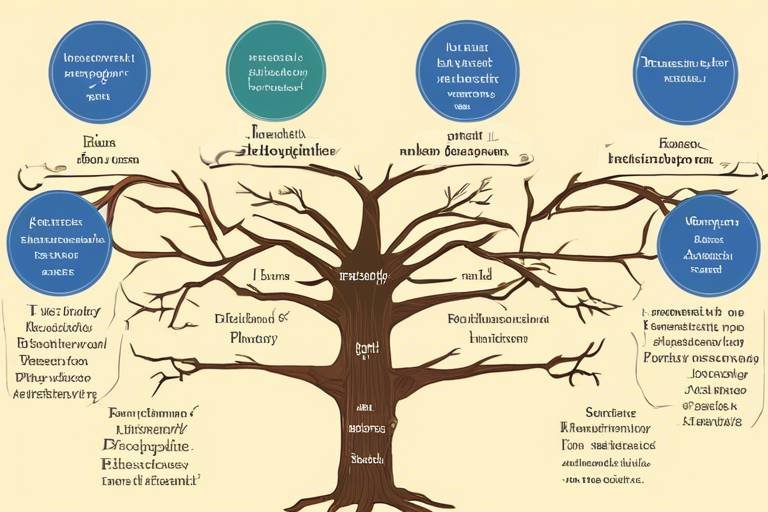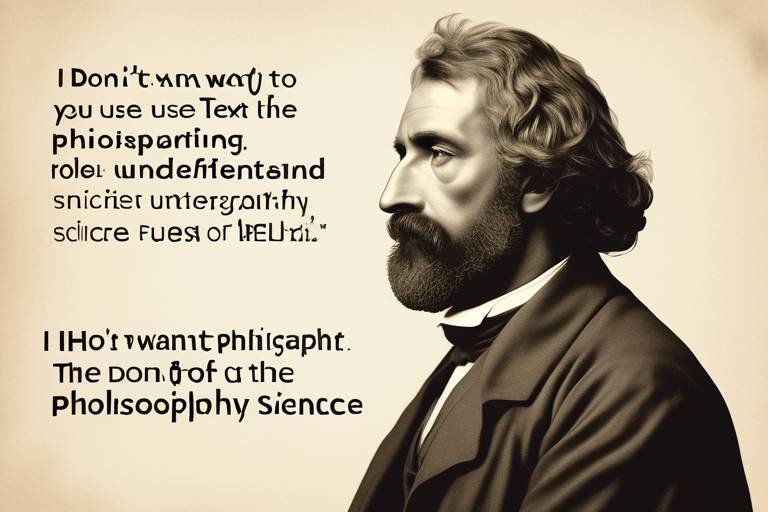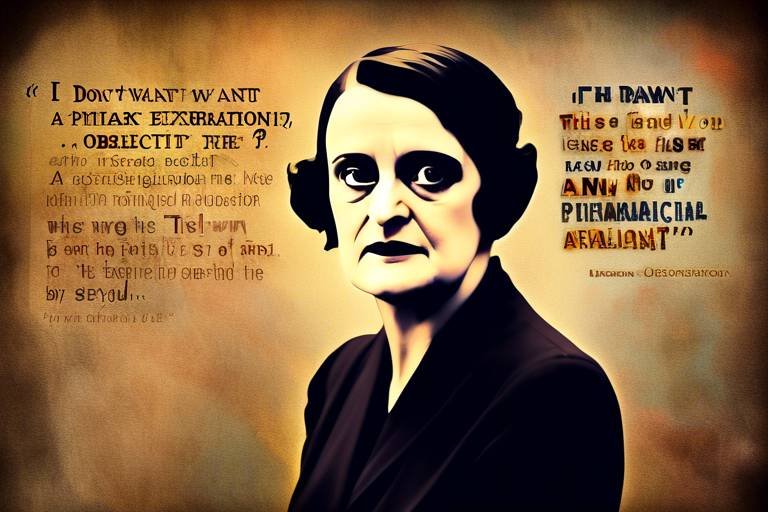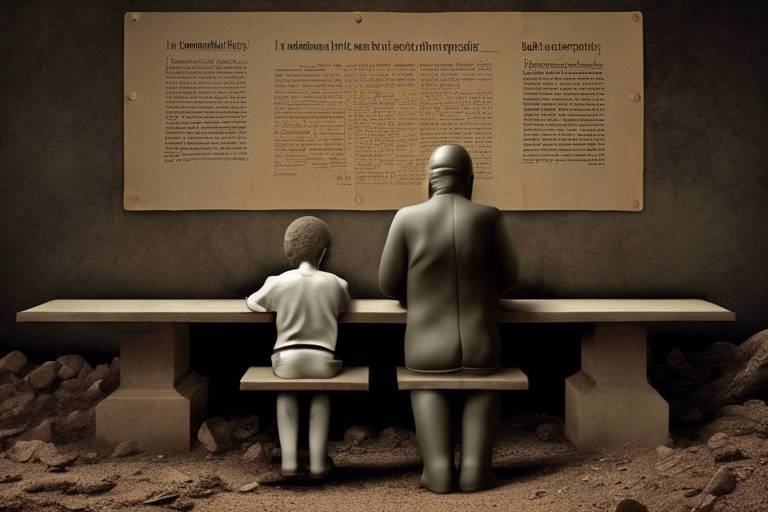Philosophy's Influence on Existential Crisis
The interplay between philosophy and the existential crisis is a fascinating journey through the depths of human thought and experience. At its core, an existential crisis is a moment when we find ourselves questioning the very fabric of our existence—our purpose, our identity, and the meaning we attribute to life itself. This profound questioning can be triggered by various life events, such as the loss of a loved one, a significant life change, or even the mundane routines that make us wonder if we're truly living or merely existing.
Philosophical perspectives provide a lens through which we can examine these crises, offering insights that can either illuminate our path or deepen our confusion. Think of it as a map in a dense forest; while some paths may lead to clarity and understanding, others may lead us deeper into the woods of uncertainty. The rich tapestry of existential thought, woven by thinkers like Kierkegaard, Nietzsche, Camus, and Sartre, serves as both a guide and a challenge, pushing us to confront uncomfortable truths about ourselves and our place in the universe.
For instance, Kierkegaard’s emphasis on the leap of faith urges us to make choices that resonate with our inner selves, even when the outcomes are uncertain. This notion can be both liberating and terrifying, as it places the weight of existence squarely on our shoulders. On the other hand, Nietzsche’s concept of the will to power inspires us to create our own values in a world that often feels indifferent to our struggles. It’s a call to arms, encouraging us to rise above despair and assert our presence in a chaotic universe.
The existential crisis, therefore, is not merely a moment of despair but a potential turning point. It can lead to profound personal growth and self-discovery if we are willing to engage with the philosophical ideas that have shaped our understanding of existence. As we navigate these turbulent waters, we might find that the very act of questioning can be a source of strength, allowing us to forge a path that is uniquely our own.
In this exploration, we will delve deeper into how these philosophical frameworks influence our perceptions of identity and meaning. We will also consider the role of anxiety, a common companion in existential thought, and how it can serve as a catalyst for authentic living. By examining these themes, we aim to uncover the profound impact that philosophy has on our understanding of existential crises and, ultimately, on the human condition itself.

Understanding Existential Crisis
An existential crisis is like standing at a crossroads in life, where every path seems uncertain and the destination unclear. It's that moment when you start to question not just the what of your life, but the why. Why are we here? What is the purpose of our existence? These questions can arise from various triggers such as major life changes, loss, or even just the mundane routine of daily life. Imagine waking up one day and feeling like a character in a play, unsure of your lines or the plot. This disconnection can lead to a profound sense of unease, as individuals grapple with the weight of their own existence.
Psychologically, an existential crisis can manifest as anxiety, depression, or a deep sense of confusion. It's not just a fleeting moment of doubt; it can be a prolonged struggle with identity and meaning. People often feel isolated during these times, as if they are the only ones facing such overwhelming questions. Yet, it's essential to recognize that this experience is a universal part of the human condition. Just as a caterpillar must struggle to break free from its cocoon to become a butterfly, so too must we confront our uncertainties to emerge as more authentic versions of ourselves.
Triggers for an existential crisis can vary widely, but some common catalysts include:
- The death of a loved one
- Relationship breakdowns
- Career changes or job loss
- Major life transitions, such as becoming a parent or retiring
- Personal failures or regrets
Each of these events can lead to a re-evaluation of one’s life and priorities, prompting questions about what truly matters. In this context, it’s crucial to understand that experiencing an existential crisis can also be an opportunity for growth. Just as a storm can clear the air, the turmoil of an existential crisis can lead to clarity and self-discovery. It forces individuals to confront uncomfortable truths and can ultimately lead to a more meaningful existence.
Moreover, the implications of an existential crisis extend beyond personal reflection; they can affect relationships, career choices, and overall life satisfaction. When individuals begin to question their purpose, they often seek out deeper connections with others, striving for authenticity in their interactions. This quest for meaning can lead to transformative experiences, where individuals learn to embrace their vulnerabilities and redefine their values.
In summary, understanding an existential crisis involves recognizing it as a pivotal moment in one’s life. It’s a phase that, while challenging, can catalyze profound personal growth and a deeper understanding of oneself and the world. Embracing this crisis rather than shying away from it can lead to a more authentic and fulfilling existence.

Philosophical Roots of Existentialism
Existentialism, as a philosophical movement, is deeply rooted in the quest for understanding the human condition. It emerged in the 19th and 20th centuries, shaped by the thoughts and writings of several pivotal figures. At its core, existentialism grapples with the fundamental questions of existence, freedom, and the search for meaning in a world that often appears chaotic and indifferent. Key philosophers such as Søren Kierkegaard and Friedrich Nietzsche are often credited with laying the groundwork for this rich philosophical tradition.
Kierkegaard, often considered the father of existentialism, introduced the idea that individual experience and personal choice are paramount. He believed that each person must confront their own existence and make choices that reflect their true self, a concept he famously termed the "leap of faith." This leap is not merely a blind jump into the unknown; rather, it is a conscious decision to embrace uncertainty and seek authenticity in one's life. Kierkegaard's emphasis on subjective experience challenges individuals to look inward, prompting a profound exploration of identity.
On the other hand, Nietzsche's philosophy radically redefined the landscape of existential thought. He famously declared that "God is dead," a provocative statement that reflects the decline of traditional values and the rise of individualism. Nietzsche's concept of the will to power encourages individuals to assert their own values and create meaning in a world that lacks inherent purpose. This idea invites a powerful re-evaluation of one's life, pushing individuals to rise above nihilism and embrace their potential to shape their existence. In this way, Nietzsche's philosophy serves as both a challenge and an inspiration for those grappling with existential crises.
Furthermore, the exploration of existentialism would be incomplete without mentioning the contributions of Jean-Paul Sartre and Albert Camus. Sartre's notion of "existence precedes essence" posits that individuals are not defined by any predetermined nature; instead, they are free to create their own essence through their choices and actions. This radical freedom, however, comes with the burden of responsibility, often leading to feelings of angst and despair. Camus, on the other hand, introduced the concept of the absurd, suggesting that life inherently lacks meaning. Yet, he argues that rather than succumbing to despair, one should confront this absurdity with defiance, embracing the freedom that comes from acknowledging life's inherent unpredictability.
In summary, the philosophical roots of existentialism are deeply intertwined with the ideas of choice, freedom, and the search for meaning. From Kierkegaard’s emphasis on personal faith to Nietzsche’s challenge to create one’s own values, these thinkers invite us to engage with our existence in a way that is both profound and transformative. Their ideas not only illuminate the nature of existential crises but also provide a framework for navigating the complexities of the human experience.

Kierkegaard's Leap of Faith
Søren Kierkegaard, often considered the father of existentialism, introduced the concept of the "leap of faith," which serves as a guiding light for those grappling with existential crises. Imagine standing at the edge of a cliff, peering into the abyss below. This metaphor captures the essence of Kierkegaard's philosophy: the idea that to truly embrace life, one must take a daring leap into the unknown. In a world filled with uncertainties, the leap of faith symbolizes the courage to make choices that define our existence, even when the outcome is not guaranteed.
Kierkegaard believed that our struggles with meaning and identity stem from an inherent tension between the finite and the infinite. On one hand, we are bound by our earthly experiences, our relationships, and societal expectations. On the other hand, we yearn for something greater, something transcendent that offers a sense of purpose. This internal conflict often leads to feelings of despair and confusion, especially during an existential crisis. Kierkegaard's leap of faith encourages individuals to confront these feelings head-on, asserting that embracing uncertainty is not merely an option but a necessity for authentic existence.
In practical terms, taking a leap of faith involves several key elements:
- Personal Choice: Kierkegaard emphasized that each person must make their own choices, as these decisions shape our identity and essence. The leap of faith is about committing to a path that resonates with one's true self.
- Embracing Uncertainty: Accepting that life is filled with unknowns can be daunting. However, Kierkegaard argued that this uncertainty is what makes life rich and meaningful. By letting go of the need for absolute certainty, individuals can find freedom in their choices.
- Faith: At the core of Kierkegaard's philosophy is the idea of faith—not just in a religious sense, but faith in oneself and in the possibility of creating meaning. This leap requires trust in the process of living, even when the path is unclear.
Ultimately, Kierkegaard's leap of faith serves as a powerful reminder that life is not a predetermined script but a canvas awaiting our brushstrokes. By daring to leap, we open ourselves up to a world of possibilities, allowing us to craft our own meaning and navigate the complexities of existence. This approach not only fosters personal growth but also cultivates resilience, enabling individuals to face their existential crises with newfound strength and clarity.
1. What is the leap of faith according to Kierkegaard?
The leap of faith is a philosophical concept that emphasizes the importance of making personal choices and embracing uncertainty in order to create meaning in life.
2. How does Kierkegaard's philosophy relate to existential crises?
Kierkegaard's philosophy provides a framework for understanding existential crises by encouraging individuals to confront their feelings of despair and make choices that reflect their true selves.
3. Can anyone take a leap of faith?
Yes, Kierkegaard believed that everyone has the capacity to take a leap of faith, but it requires courage and a willingness to embrace uncertainty.
4. How can the leap of faith lead to personal growth?
By taking a leap of faith, individuals can confront their fears, make meaningful choices, and ultimately discover a deeper sense of purpose and authenticity in their lives.

Nietzsche's Will to Power
Friedrich Nietzsche, a titan of existential thought, introduced the concept of the Will to Power, which serves as a cornerstone for understanding human motivation and existence. At its core, the Will to Power is not merely about domination or control over others; rather, it's about the intrinsic drive within each individual to assert their own values and create meaning in a world that often appears chaotic and indifferent. Imagine standing at the edge of a vast ocean, the waves crashing against the shore, symbolizing the overwhelming forces of life. In this tumult, Nietzsche invites us to become the architects of our own lives, to harness our inner strength and transform the chaos into something meaningful.
Nietzsche believed that this drive is fundamental to human nature, suggesting that individuals are constantly striving to overcome obstacles and push beyond their limits. This perspective empowers us to view challenges not as insurmountable barriers but as opportunities for growth. When faced with an existential crisis, the Will to Power encourages us to confront our despair and instead channel it into creative expression and personal evolution. It’s akin to a phoenix rising from the ashes; through our struggles, we can forge a new identity and purpose.
Furthermore, Nietzsche’s philosophy posits that the act of creating meaning is a deeply personal endeavor. Each individual has the power to define their own values and beliefs, which can lead to a profound sense of freedom. This liberation, however, comes with the weight of responsibility. As we craft our essence, we must also grapple with the consequences of our choices. It’s a double-edged sword: while we are free to shape our destinies, we are also accountable for the paths we choose. This tension can heighten feelings of existential angst, yet it also opens the door to authentic living.
Nietzsche's challenge to us is clear: in a universe that lacks inherent meaning, we must become the creators of our own narratives. By embracing the Will to Power, we can transcend nihilism—the belief that life is meaningless—and instead find strength in our ability to forge our own paths. It’s about taking the reins of our existence and boldly declaring, “I will create my own meaning!” This mindset not only empowers individuals but also fosters resilience in the face of life’s uncertainties.
In summary, Nietzsche's Will to Power serves as both a call to action and a source of inspiration. It urges us to confront our existential crises head-on, to recognize the power we hold within ourselves to shape our lives. By embracing this philosophy, we can transform despair into determination and navigate the complexities of existence with courage and creativity.
- What is Nietzsche's Will to Power?
It is a philosophical concept that emphasizes the intrinsic drive within individuals to assert their own values and create meaning in life.
- How does the Will to Power relate to existential crises?
The Will to Power encourages individuals to confront their crises and transform challenges into opportunities for personal growth and meaning-making.
- Is the Will to Power about domination?
No, it is more about personal empowerment and the drive to overcome obstacles rather than controlling others.

will to power
This article explores how various philosophical perspectives shape our understanding of existential crises, examining their implications on identity, meaning, and the human condition.
An existential crisis occurs when individuals question the meaning and purpose of their existence. This section delves into its psychological aspects and triggers, shedding light on the human experience.
This section examines the historical origins of existentialism, highlighting key philosophers such as Kierkegaard and Nietzsche, who laid the groundwork for understanding human existence and individual freedom.
Kierkegaard emphasized the importance of personal choice and faith in navigating an existential crisis, suggesting that embracing uncertainty can lead to authentic existence and deeper self-understanding.
Nietzsche's concept of the is a profound and transformative idea that challenges us to assert our own values in a world that often feels indifferent to our existence. It's not just about survival or the pursuit of happiness; it's about the drive to overcome obstacles, to create meaning, and to shape our own destinies. Imagine standing at the edge of a vast ocean, waves crashing around you, and instead of feeling overwhelmed, you decide to swim against the current. This is the essence of the will to power—it's about taking control of your life and asserting your individuality in the face of existential despair.
Nietzsche argues that the will to power is a fundamental driving force in human beings, pushing us to strive for greatness, to innovate, and to create values that resonate with our true selves. He believed that life is inherently chaotic and devoid of universal meaning, which can lead to feelings of nihilism. However, instead of succumbing to despair, Nietzsche encourages us to embrace this chaos as an opportunity for personal empowerment. By recognizing that we are the architects of our own lives, we can forge our paths and create our meanings.
In practical terms, the will to power manifests in various aspects of our lives. It can be seen in:
- Creative expression: Artists, writers, and musicians often channel their inner struggles into their work, using their creativity as a means of asserting their identity.
- Personal growth: Individuals who embrace challenges and seek self-improvement embody the will to power, constantly striving to better themselves and their circumstances.
- Leadership: Those who take charge and inspire others are often driven by a strong will to power, shaping the world around them through their vision and determination.
Ultimately, Nietzsche's will to power serves as a powerful framework for overcoming existential despair. It encourages us to reject passivity and embrace our potential to create meaning in our lives. By recognizing our strength and capacity for growth, we can navigate the turbulent waters of existence with confidence and purpose.
Albert Camus introduced the idea of the absurd, arguing that life lacks inherent meaning. This perspective encourages individuals to confront their existential crisis with defiance and acceptance.
Jean-Paul Sartre's existentialism posits that individuals are condemned to be free, facing the weight of responsibility in crafting their own essence and meaning, which can intensify feelings of existential angst.
Anxiety is a central theme in existential philosophy, often viewed as a necessary condition for authentic existence. This section explores how anxiety can lead to personal growth and self-discovery.
Martin Heidegger's exploration of Being emphasizes the importance of confronting our mortality, suggesting that awareness of death can catalyze a more meaningful engagement with life.
Existential therapy draws from philosophical ideas to help individuals navigate crises, focusing on personal meaning, freedom, and the search for authenticity in the face of life's uncertainties.
- What is an existential crisis?
An existential crisis is a moment when an individual questions the very foundations of their life, including the meaning and purpose of their existence. - How can philosophy help with existential crises?
Philosophy provides frameworks and perspectives that can help individuals navigate their feelings of despair and uncertainty, offering tools for personal growth and self-discovery. - What is the will to power?
The will to power is a concept by Nietzsche that refers to the fundamental drive in humans to assert their values and create meaning in their lives.

challenges individuals to assert their own values and create meaning in a seemingly indifferent universe, providing a powerful framework for overcoming existential despair.
This article explores how various philosophical perspectives shape our understanding of existential crises, examining their implications on identity, meaning, and the human condition.
An existential crisis occurs when individuals question the meaning and purpose of their existence. This section delves into its psychological aspects and triggers, shedding light on the human experience.
This section examines the historical origins of existentialism, highlighting key philosophers such as Kierkegaard and Nietzsche, who laid the groundwork for understanding human existence and individual freedom.
Kierkegaard emphasized the importance of personal choice and faith in navigating an existential crisis, suggesting that embracing uncertainty can lead to authentic existence and deeper self-understanding.
Nietzsche's concept of the will to power challenges individuals to assert their own values and create meaning in a seemingly indifferent universe, providing a powerful framework for overcoming existential despair. In a world that often feels chaotic and devoid of purpose, Nietzsche encourages us to take the reins of our own lives. This is not merely about survival; it's about thriving amidst the absurdity of existence. By asserting our values, we become the architects of our own destiny, crafting meaning where none seems to exist.
Imagine standing in a vast, empty desert. The sun blazes overhead, and the horizon stretches infinitely, seemingly devoid of direction. In this desolate landscape, you have two choices: succumb to the overwhelming sense of insignificance or begin to carve out your own path. Nietzsche’s philosophy speaks to this very moment. He invites us to embrace our inherent power to shape our lives, to define what is meaningful to us, and to live authentically according to our values.
In practical terms, this can manifest in several ways:
- Self-Reflection: Take time to ponder what truly matters to you. What are your core beliefs? What passions ignite your spirit?
- Value Creation: Actively engage in activities that align with your personal values. Whether it's through art, relationships, or professional pursuits, infuse your actions with meaning.
- Resilience: When faced with challenges, remember that these obstacles are opportunities for growth. Embrace them as part of your journey.
Ultimately, Nietzsche’s framework serves as a powerful antidote to the despair that can accompany an existential crisis. By encouraging individuals to create their own values and meanings, he empowers us to rise above the chaos and find purpose in our lives.
Albert Camus introduced the idea of the absurd, arguing that life lacks inherent meaning. This perspective encourages individuals to confront their existential crisis with defiance and acceptance.
Jean-Paul Sartre's existentialism posits that individuals are condemned to be free, facing the weight of responsibility in crafting their own essence and meaning, which can intensify feelings of existential angst.
Anxiety is a central theme in existential philosophy, often viewed as a necessary condition for authentic existence. This section explores how anxiety can lead to personal growth and self-discovery.
Martin Heidegger's exploration of Being emphasizes the importance of confronting our mortality, suggesting that awareness of death can catalyze a more meaningful engagement with life.
Existential therapy draws from philosophical ideas to help individuals navigate crises, focusing on personal meaning, freedom, and the search for authenticity in the face of life's uncertainties.
- What is an existential crisis?
An existential crisis is a moment when an individual questions the very foundations of their life, such as the meaning and purpose of their existence. - How can philosophy help during an existential crisis?
Philosophy provides frameworks for understanding and navigating existential crises, offering insights into personal values, freedom, and the search for meaning. - What role does anxiety play in existential thought?
Anxiety is often seen as a catalyst for authentic existence, prompting individuals to confront their fears and discover deeper meanings in life.

The Absurd in Camus' Philosophy
Albert Camus, a towering figure in existential thought, introduced a compelling concept known as the absurd. This idea revolves around the inherent conflict between the human desire for meaning and the indifferent universe that offers none. Imagine standing on a vast, empty beach, yearning to find purpose in the waves that crash without intention. This is the essence of the absurd—our search for significance in a world that seems to lack it.
In his seminal work, The Myth of Sisyphus, Camus presents the story of Sisyphus, a figure from Greek mythology condemned to roll a boulder up a hill only for it to roll back down each time he reaches the top. This endless cycle symbolizes the futile struggle against the absurd. Camus famously concludes that “one must imagine Sisyphus happy,” suggesting that the act of embracing our struggles, despite their futility, can lead to a form of liberation. By acknowledging the absurdity of our existence, we can find a deeper sense of freedom and authenticity.
Camus encourages us to confront our existential crises not with despair but with defiance. He argues that instead of succumbing to nihilism, we should accept the absurd condition of life and engage with it fully. This acceptance doesn’t mean resignation; rather, it’s an invitation to create our own meaning in a world that offers none. Here are a few ways Camus suggests we can navigate this absurdity:
- Embrace the struggle: Acknowledge that life is filled with challenges and uncertainties, and find joy in the journey itself.
- Live authentically: Make choices that reflect your true self, rather than conforming to societal expectations.
- Seek personal meaning: Create your own values and purposes, rather than searching for them externally.
Ultimately, Camus’ philosophy of the absurd invites us to engage with life’s uncertainties, pushing us to confront our fears and desires head-on. It serves as a reminder that while the universe may be indifferent, our responses to it can be rich and meaningful. By embracing the absurd, we can find a sense of empowerment that propels us forward, transforming our existential crises into opportunities for growth and self-discovery.
1. What is the absurd according to Camus?
Camus defines the absurd as the conflict between the human desire for meaning and the indifferent universe that provides none. It highlights the struggle to find significance in a seemingly meaningless world.
2. How does Camus suggest we respond to the absurd?
Camus encourages individuals to confront the absurd with defiance, embracing the struggle of existence and creating their own meaning rather than succumbing to despair.
3. What does the story of Sisyphus represent?
The story of Sisyphus symbolizes the futile nature of human endeavors. However, Camus concludes that one must imagine Sisyphus happy, indicating that embracing our struggles can lead to a deeper sense of freedom.
4. Can the absurd lead to personal growth?
Yes! By acknowledging the absurdity of life, individuals can engage more authentically with their experiences, leading to personal growth and self-discovery.

Sartre's Freedom and Responsibility
Jean-Paul Sartre, one of the most influential figures in existential philosophy, famously declared that "existence precedes essence." This radical idea emphasizes that people are not born with a predetermined purpose or nature; instead, they are thrust into a world where they must define themselves through their choices. Imagine being handed a blank canvas and a palette of colors, but no instructions—this is how Sartre views human existence. We are the artists of our own lives, responsible for creating meaning in a universe that offers none inherently.
However, with this freedom comes an immense weight of responsibility. Sartre argues that individuals are "condemned to be free," meaning that we cannot escape the burden of making choices. Every decision we make not only shapes our own identity but also reflects on the broader human experience. This can lead to feelings of anxiety, as the realization that our choices are ours alone can be overwhelming. It's like standing at a crossroads without a map, aware that each path you take will lead to different outcomes, and yet you must choose.
In Sartre's view, this responsibility is not something to be feared but embraced. He believed that acknowledging our freedom allows us to live authentically. When we take ownership of our decisions, we begin to understand ourselves and our place in the world. It's a transformative process—one that requires courage and introspection. To illustrate this, consider the following points:
- Authenticity: Living authentically means aligning your actions with your true self, rather than conforming to societal expectations.
- Engagement: Sartre encourages individuals to actively engage with their choices and the consequences that follow, fostering a deeper connection with their existence.
- Empowerment: By recognizing our freedom, we empower ourselves to create our own values and meanings, rather than relying on external sources.
Ultimately, Sartre's philosophy challenges us to confront the existential angst that arises from our freedom. Instead of succumbing to despair, we can view our ability to choose as a gift. It's an invitation to craft our own narratives, to be the protagonists in our stories. Just as a writer revises their draft, we too have the power to reshape our lives based on the choices we make. This perspective not only fosters personal growth but also encourages a sense of interconnectedness with others, as we recognize that everyone is on their own journey of self-discovery.
In conclusion, Sartre's exploration of freedom and responsibility serves as a profound reminder that while life may lack inherent meaning, we possess the ability to create our own. By embracing this freedom, we can navigate the complexities of existence with authenticity and purpose, transforming our existential crises into opportunities for growth and self-realization.
- What is Sartre's main idea about freedom? Sartre believes that individuals are free to make their own choices and must take responsibility for those choices, as existence precedes essence.
- How does Sartre's philosophy relate to anxiety? Sartre's emphasis on freedom can lead to anxiety because individuals must confront the weight of their choices and the consequences that follow.
- What does it mean to live authentically according to Sartre? Living authentically means making choices that align with one's true self rather than conforming to societal pressures or expectations.

The Role of Anxiety in Existential Thought
Anxiety plays a pivotal role in existential philosophy, often regarded as a necessary companion on the journey toward authentic existence. It's fascinating to think about how anxiety, which many perceive as a negative emotion, can actually serve as a catalyst for profound personal growth. When we experience anxiety, it often signals that we are grappling with fundamental questions about our existence, purpose, and the choices we make. Isn't it intriguing how discomfort can lead us to deeper self-reflection and understanding? This existential angst can push us to confront uncomfortable truths about ourselves and the world around us.
Many philosophers have explored the relationship between anxiety and existence. For instance, Martin Heidegger, in his seminal work Being and Time, argues that anxiety is a crucial aspect of being human. He believed that when we confront our own mortality, we become more aware of the importance of our choices and the fleeting nature of life. This awareness can ignite a sense of urgency, prompting us to live more authentically and purposefully. Imagine standing at the edge of a vast cliff, feeling that rush of fear and exhilaration; it’s in that moment of vulnerability that we often find clarity about what truly matters to us.
Moreover, anxiety can lead to a greater appreciation for the present moment. When we are anxious, we may become acutely aware of our surroundings and the people in our lives. This heightened awareness can foster connections and a deeper understanding of the human experience. It’s almost as if anxiety acts like a magnifying glass, allowing us to scrutinize our lives more closely. In this way, it can be a powerful tool for self-discovery.
However, it's essential to recognize that while anxiety can lead to personal growth, it can also be overwhelming. The key lies in how we respond to our anxiety. Some individuals may find themselves paralyzed by fear, while others may choose to embrace it as a part of their journey. This choice is reminiscent of the age-old debate between determinism and free will. Are we victims of our circumstances, or do we have the power to shape our destinies? The answer may lie in our ability to confront and engage with our anxiety.
In existential therapy, practitioners often encourage clients to explore their anxiety as a means of gaining insight into their lives. By discussing their fears and uncertainties, individuals can start to unravel the layers of their existence and discover what truly resonates with them. This therapeutic approach aligns with the idea that anxiety, when understood and accepted, can lead to a more authentic life. The therapeutic process can be likened to peeling an onion; while it may bring tears, each layer reveals deeper truths about our identities and desires.
Ultimately, the role of anxiety in existential thought is multifaceted. It can be both a burden and a blessing, depending on how we choose to engage with it. By embracing anxiety as a natural part of the human experience, we can transform it into a powerful motivator for change and self-discovery. So, the next time you find yourself feeling anxious, consider it an invitation to explore the depths of your existence. What might it reveal about your values, aspirations, and the life you truly want to lead?
- What is existential anxiety? Existential anxiety refers to the feelings of unease and uncertainty that arise when individuals confront fundamental questions about their existence, purpose, and freedom.
- How can anxiety lead to personal growth? Anxiety can prompt self-reflection and a deeper understanding of one's values and desires, ultimately leading to a more authentic and meaningful life.
- What role do philosophers play in understanding anxiety? Philosophers like Heidegger and Sartre have explored the significance of anxiety in human existence, providing frameworks for understanding how it can influence our choices and sense of self.

Heidegger's Being and Time
Martin Heidegger's seminal work, Being and Time, is a profound exploration of what it means to be human. At its core, Heidegger delves into the concept of Being, urging us to confront the fundamental aspects of our existence. He posits that our awareness of mortality is not just a grim reality but a catalyst for living a more authentic life. By recognizing our finite nature, we are prompted to engage deeply with the world around us, rather than merely existing in it.
Heidegger introduces the term Dasein, which translates to "being-there." This concept emphasizes the unique position of humans as beings who are aware of their own existence and the temporality that comes with it. Dasein is characterized by its ability to reflect on its own being, leading to an existential awareness that shapes our experiences and choices. In essence, Heidegger argues that to truly understand our existence, we must confront the inevitable reality of death, which he believes is essential for personal growth and authentic living.
What makes Being and Time particularly compelling is its insistence on the importance of authenticity. Heidegger challenges us to live genuinely, to embrace our individuality, and to resist the societal pressures that often lead us to conform. He suggests that many people live in a state of inauthenticity, where they allow external factors to dictate their choices and values. This lack of authenticity can lead to feelings of alienation and despair, particularly during an existential crisis.
Furthermore, Heidegger's exploration of anxiety is crucial. He views anxiety not merely as a negative experience but as a necessary part of the human condition. When we experience anxiety, it serves as a reminder of our freedom and the weight of our choices. It compels us to reflect on our lives and the paths we have taken. In this way, anxiety can be transformed into a powerful tool for self-discovery and personal growth.
In summary, Heidegger's insights in Being and Time encourage us to embrace our mortality and the accompanying anxiety as a means to live more authentically. By doing so, we can navigate our existential crises with a deeper sense of purpose and meaning. This philosophical approach not only enriches our understanding of existence but also empowers us to create a life that resonates with our true selves.
- What is the main idea of Heidegger's Being and Time?
Heidegger's main idea revolves around the concept of 'Dasein' and emphasizes the importance of confronting our mortality to live authentically. - How does anxiety relate to existentialism?
Anxiety is seen as a necessary condition for authentic existence, prompting self-reflection and personal growth. - What does Dasein mean?
Dasein refers to the unique human ability to be aware of one's existence and the implications of that awareness. - Why is authenticity important in Heidegger's philosophy?
Authenticity is crucial as it allows individuals to live genuinely and resist societal pressures that lead to inauthenticity.

Being
This article explores how various philosophical perspectives shape our understanding of existential crises, examining their implications on identity, meaning, and the human condition.
An existential crisis occurs when individuals question the meaning and purpose of their existence. This section delves into its psychological aspects and triggers, shedding light on the human experience.
This section examines the historical origins of existentialism, highlighting key philosophers such as Kierkegaard and Nietzsche, who laid the groundwork for understanding human existence and individual freedom.
Kierkegaard emphasized the importance of personal choice and faith in navigating an existential crisis, suggesting that embracing uncertainty can lead to authentic existence and deeper self-understanding.
Nietzsche's concept of the will to power challenges individuals to assert their own values and create meaning in a seemingly indifferent universe, providing a powerful framework for overcoming existential despair.
Albert Camus introduced the idea of the absurd, arguing that life lacks inherent meaning. This perspective encourages individuals to confront their existential crisis with defiance and acceptance.
Jean-Paul Sartre's existentialism posits that individuals are condemned to be free, facing the weight of responsibility in crafting their own essence and meaning, which can intensify feelings of existential angst.
Anxiety is a central theme in existential philosophy, often viewed as a necessary condition for authentic existence. This section explores how anxiety can lead to personal growth and self-discovery.
Martin Heidegger's exploration of emphasizes the importance of confronting our mortality, suggesting that awareness of death can catalyze a more meaningful engagement with life. Heidegger argues that our understanding of is deeply intertwined with our existence and the temporal nature of life itself. He proposes that by acknowledging our finite existence, we can cultivate a richer appreciation for the present moment. This realization can be both liberating and daunting, as it forces us to grapple with the transient nature of our experiences.
In Heidegger's view, many individuals live in a state of inauthenticity, where they are distracted by the mundane aspects of life, avoiding the deeper questions of existence. He challenges us to break free from this cycle and engage with our true selves, which requires a profound understanding of our own . This engagement leads to a more authentic life, where we are no longer merely existing but actively participating in the unfolding of our own destiny.
Heidegger's insights can be summarized in the following table:
| Concept | Description |
|---|---|
| The essence of existence that we must confront to live authentically. | |
| Authenticity | Living in accordance with one's true self and values, rather than conforming to societal expectations. |
| Mortality | Acknowledging our finite existence as a catalyst for meaningful living. |
Existential therapy draws from philosophical ideas to help individuals navigate crises, focusing on personal meaning, freedom, and the search for authenticity in the face of life's uncertainties.
- What is an existential crisis? An existential crisis is a moment when an individual questions the very foundations of their life, including their purpose and values.
- How can philosophy help with existential crises? Different philosophical perspectives provide frameworks for understanding and navigating the complexities of existence, helping individuals find meaning and authenticity.
- What role does anxiety play in existential thought? Anxiety is seen as a necessary condition for authentic existence, often leading to personal growth and deeper self-awareness.
- How can existential therapy assist individuals? Existential therapy focuses on helping individuals explore their personal meaning and freedom, guiding them through the uncertainties of life.

emphasizes the importance of confronting our mortality, suggesting that awareness of death can catalyze a more meaningful engagement with life.
This article explores how various philosophical perspectives shape our understanding of existential crises, examining their implications on identity, meaning, and the human condition.
An existential crisis occurs when individuals question the meaning and purpose of their existence. This section delves into its psychological aspects and triggers, shedding light on the human experience.
This section examines the historical origins of existentialism, highlighting key philosophers such as Kierkegaard and Nietzsche, who laid the groundwork for understanding human existence and individual freedom.
Kierkegaard emphasized the importance of personal choice and faith in navigating an existential crisis, suggesting that embracing uncertainty can lead to authentic existence and deeper self-understanding.
Nietzsche's concept of the will to power challenges individuals to assert their own values and create meaning in a seemingly indifferent universe, providing a powerful framework for overcoming existential despair.
Albert Camus introduced the idea of the absurd, arguing that life lacks inherent meaning. This perspective encourages individuals to confront their existential crisis with defiance and acceptance.
Jean-Paul Sartre's existentialism posits that individuals are condemned to be free, facing the weight of responsibility in crafting their own essence and meaning, which can intensify feelings of existential angst.
Anxiety is a central theme in existential philosophy, often viewed as a necessary condition for authentic existence. This section explores how anxiety can lead to personal growth and self-discovery.
Martin Heidegger's exploration of Being emphasizes the importance of confronting our mortality, suggesting that awareness of death can catalyze a more meaningful engagement with life. The act of acknowledging our finite existence can serve as a powerful motivator, urging us to live more fully and authentically. When we face the reality of death, we are often jolted into a deeper appreciation for the present moment. We begin to prioritize what truly matters, fostering connections with others, pursuing passions, and seeking out experiences that resonate with our core values.
This confrontation with mortality can be daunting, but it also opens a door to profound insights about our lives. For example:
- Awareness of Time: Realizing that our time is limited can inspire us to make choices that align with our true desires.
- Value of Relationships: Understanding that life is fleeting encourages us to cherish our relationships and invest in meaningful connections.
- Pursuit of Passion: The urgency of life can push us to pursue our dreams and passions without delay.
Heidegger argues that this awareness leads to a more authentic existence. It pushes us to confront our fears and desires, allowing us to live with intention. When we recognize that life is not a dress rehearsal, we are compelled to engage with it more deeply, embracing both its joys and sorrows. This engagement with life, catalyzed by our awareness of mortality, can transform our existential crises into opportunities for growth and enlightenment.
Existential therapy draws from philosophical ideas to help individuals navigate crises, focusing on personal meaning, freedom, and the search for authenticity in the face of life's uncertainties.
An existential crisis is a moment when an individual questions the very foundations of their life, such as purpose, meaning, and identity.
Philosophy can provide frameworks and perspectives that help individuals understand their feelings and circumstances, offering pathways to find meaning and make choices aligned with their values.
Anxiety is seen as a natural response to the awareness of freedom and responsibility, and it can lead to personal growth and a deeper understanding of oneself.
Confronting mortality can enhance your appreciation for life, prompting you to prioritize what truly matters and engage with life more authentically.

Existential Therapy Approaches
Existential therapy is a unique approach that draws heavily from the rich tapestry of existential philosophy to help individuals navigate the often turbulent waters of life. At its core, this therapeutic method emphasizes the importance of personal meaning, freedom, and authenticity, especially in the face of life's inevitable uncertainties. Imagine standing at a crossroads, where every path represents a different choice, and existential therapy acts like a trusted guide, helping you to not only understand the landscape but also to discover the courage to choose your own direction.
One of the fundamental tenets of existential therapy is the belief that anxiety, while uncomfortable, is a natural part of the human experience. This anxiety can serve as a catalyst for profound personal growth and self-discovery. Just as a seed must break through the soil to grow, individuals may need to confront their fears and uncertainties to blossom into their true selves. This process can be daunting, but it is often where the most significant transformations occur.
Existential therapists encourage clients to explore their values, beliefs, and the essence of their existence. They engage in deep conversations that challenge individuals to reflect on their lives, asking questions like:
- What gives my life meaning?
- Am I living authentically?
- What are my responsibilities to myself and others?
These questions are not just rhetorical; they are the backbone of the therapeutic process, prompting clients to take a closer look at their lives and the choices they make. By fostering a safe and open environment, existential therapists help clients confront uncomfortable truths about themselves and their existence, ultimately guiding them toward a more authentic way of living.
Another key aspect of existential therapy is the emphasis on the present moment. Therapists encourage clients to focus on their current experiences rather than getting lost in regrets about the past or anxieties about the future. This mindfulness approach allows individuals to fully engage with their feelings and thoughts, providing clarity and insight into their true selves. It’s akin to tuning into a radio station that resonates with your inner voice, allowing you to hear the messages that have been drowned out by the noise of everyday life.
Existential therapy also recognizes the importance of relationships and social connections. Humans are inherently social beings, and our interactions with others can profoundly influence our sense of self and purpose. Therapists often explore how clients relate to others and how these relationships shape their understanding of existence. By examining these connections, individuals can gain insights into their behavior and the underlying motivations that drive them.
In conclusion, existential therapy provides a powerful framework for individuals grappling with existential crises. By embracing the discomfort of anxiety and exploring the depths of their existence, clients can uncover personal meaning and authenticity. This therapeutic approach not only aids in navigating crises but also fosters a deeper understanding of oneself and the world around them.
What is existential therapy?
Existential therapy is a therapeutic approach that focuses on helping individuals find personal meaning and authenticity in their lives, drawing from existential philosophy.
How does anxiety play a role in existential therapy?
Anxiety is viewed as a natural part of the human experience in existential therapy. It can serve as a catalyst for personal growth and self-discovery.
What techniques do existential therapists use?
Existential therapists typically engage clients in deep conversations, encouraging them to reflect on their values, beliefs, and relationships to foster self-understanding.
Can existential therapy help with depression?
Yes, existential therapy can be beneficial for individuals experiencing depression by helping them explore the meaning of their experiences and find a sense of purpose.
Frequently Asked Questions
- What is an existential crisis?
An existential crisis is a moment when individuals deeply question the meaning and purpose of their life. It often arises during significant life changes or moments of introspection, prompting thoughts about identity, existence, and the human condition.
- How do philosophical perspectives influence existential crises?
Philosophical perspectives, such as those from Kierkegaard, Nietzsche, and Camus, provide frameworks for understanding and navigating existential crises. They encourage individuals to explore concepts like personal choice, the creation of meaning, and confrontation with the absurdity of life.
- What role does anxiety play in existential thought?
Anxiety is often seen as a vital part of existential philosophy. It can lead to personal growth and self-discovery, pushing individuals to confront their fears and embrace the uncertainties of life, ultimately leading to a more authentic existence.
- Can existential therapy help with existential crises?
Yes! Existential therapy draws on philosophical ideas to help individuals navigate their crises. It focuses on finding personal meaning, embracing freedom, and seeking authenticity, which can be incredibly beneficial during challenging times.
- What did Kierkegaard mean by the "leap of faith"?
Kierkegaard's "leap of faith" refers to the idea that individuals must make personal choices and embrace uncertainty to find authentic existence. It's about trusting oneself and making commitments despite the lack of guarantees.
- How does Nietzsche's concept of the "will to power" relate to existential crises?
Nietzsche's "will to power" encourages individuals to assert their own values and create meaning in a world that may seem indifferent. This idea can empower people during existential crises by shifting their focus from despair to personal agency and creativity.
- What is the "absurd" in Camus' philosophy?
In Camus' philosophy, the "absurd" refers to the conflict between humans' search for meaning and the indifferent universe. He suggests that rather than succumbing to despair, individuals should confront this absurdity with defiance and acceptance, finding their own meaning in life.
- How does Heidegger's concept of "Being" affect our understanding of existence?
Heidegger's exploration of "Being" emphasizes the importance of confronting our mortality. By acknowledging our finite existence, we can engage more meaningfully with life, prompting a deeper understanding of ourselves and our place in the world.



















